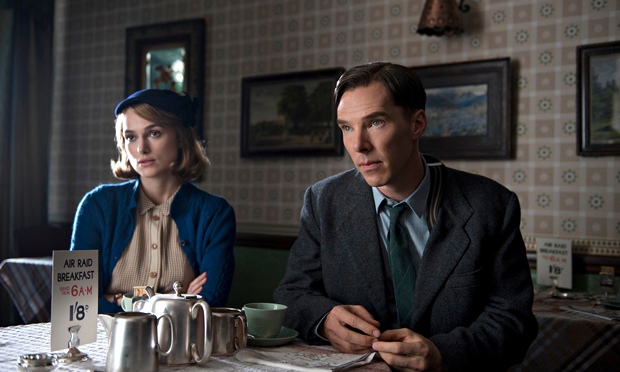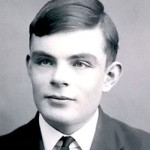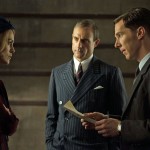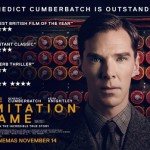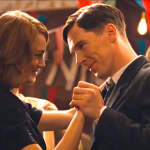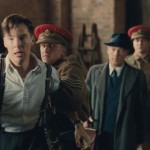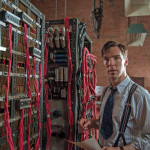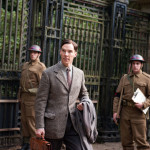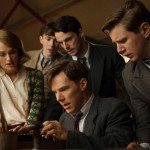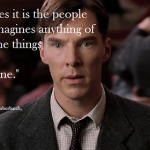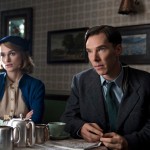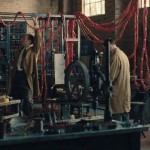The Imitation Game, named after a paper written by Alan Turing and used as a metaphor for his own life, is not the first movie about the German Enigma machines. In fact there are three others, the only one seriously providing a passable attempt at historical fact being Enigma (2001) – though that fictionalises the characters. There were plays, including Breaking the Code, not to mention several TV dramatisations, but Enigma was the first major film excursion on the story after the enigma code-breaking facility at Bletchley Park was declassified in the mid-70s.
TIG is however the first attempt at a full biopic of the genius that was Alan Turing, loosely adapted from the biography Alan Turing: The Enigma by Andrew Hodges. It focuses primarily on Turing on his peak in solving the wartime cryptological challenge, with flashbacks to his school life and a few subsequent scenes covering Turing’s arrest for “indecent behaviour.” Since homosexuality was illegal at the time, a degree of sympathetic hindsight is applied to Turing’s struggle to cope with his sexuality, and the “chemical castration” treatment that led to his apparent suicide at the age of 41 in my home town of Wilmslow.
Inevitably some liberties are taken with history and with the lives of some characters (see bottom of this review), though as this article from the Daily Telegraph shows, this is a fair attempt to dramatise the real story of how Enigma was cracked and used to provide war-winning intelligence to the British military strategists. Quotes from Wikipedia:
In a January 2015 interview with The Huffington Post, its screenwriter Graham Moore said in response to complaints about the film’s historical accuracy: “When you use the language of “fact checking” to talk about a film, I think you’re sort of fundamentally misunderstanding how art works. You don’t fact check Monet’s Water Lilies. That’s not what water lilies look like, that’s what the sensation of experiencing water lilies feel like. That’s the goal of the piece.”
In the same interview, Tyldum stated: “A lot of historical films sometimes feel like people reading a Wikipedia page to you onscreen, like just reciting “and then he did that, and then he did that, and then he did this other thing” – it’s like a “Greatest Hits” compilation. We wanted the movie to be emotional and passionate. Our goal was to give you “What does Alan Turing feel like?” What does his story feel like? What’d it feel like to be Alan Turing? Can we create the experience of sort of “Alan Turing-ness” for an audience based on his life?”
While director Morten Tyldum does a fine job in recreating the period and the atmosphere of the time, what you want to know is how well Benedict Cumberbatch handles playing a geeky genius. His casting had a personal touch, given that he is, I believe, distantly related to Turing (see here.) That he was nominated for an Oscar, albeit losing out to fellow-Brit Eddie Redmayne‘s portrayal of another troubled academic genius, Stephen Hawking, tells you he was determined to do a thorough and convincing job in depicting his 17th cousin.
Tell the truth, Cumberbatch seems to have made a specialty of such roles, having depicted Sherlock Holmes as a “high functioning sociopath” (or maybe not – see here.) In fact, his playing of both Holmes and Turing seem to suggest the characters to be on the autistic spectrum, possibly undiagnosed Asperger’s Syndrome, based on their cold, hard logic and inability to empathise – reflected in his suggestion that the military should do nothing to prevent the sinking of a ship and subsequent loss of lives because that would telegraph to the Germans that Enigma was blown, in spite of the pleas of those who would save lives now and worry about the next generation of Enigma down the line. Whether Turing said that in reality, or whether it was the military high command I can’t tell you, but see the bottom of this review for a rebuttal of the autistic hypothesis.
The other moral dilemma revealed by Graham Moore‘s script relates to Turing’s alleged discovery that one of the cryptanalysts, John Cairncross (Allen Leech), is a Russian spy – indeed, the “fifth man” in the Cambridge spy ring, but that MI6 chief Menzies, later Major-General Sir Stewart Menzies (Mark Strong) knew about it all along and was playing his double agent with false information. How far that story is as portrayed is not clear, though if Menzies placed Cairncross in the team, this would negate the previous suggestion that Turing was authorised by Churchill himself to recruit the team, as he saw fit. The fact is that Cairncross worked in a different team within Bletchley, and there is no evidence he and Turing actually met.
I have no doubts whatever that Cumberbatch researched the role with meticulous attention to detail, and for the mannered delivery he is perfect. A deeper question might be how close he got to the real man inside. Turing was among many highly intelligent eccentrics at Bletchley Park, and a kinder reading sees him as an “insensitive narcissist who found eye contact difficult, but who was very much the right man at the right time.”
The fact is that he did most to solve the riddle and in the process laid down many of the ground rules for digital computing and software as we know it today sets him apart, but his groundbreaking was apparently way beyond the comprehension of even the brightest around him – all the more since he was apparently on the constant verge of being sacked by Commander Denniston (Charles Dance) during his period at Bletchley, and Turing is constantly having to stop his machine being switched off and bemoaning how those in authority do not have a clue what he is trying to do (ultimately prevent the need for tedious daily monkey work.) The message is clear: genius is seldom recognised in its own time, but their legacy much be rewarded. A quote from Wikipedia:
Despite earlier reservations, Turing’s niece Inagh Payne told Allan Beswick of BBC Radio Manchester that the film “really did honour my uncle”.
So a homage and almost a hagiography, given that there is little critical of Turing, only his being punished for the man he was.
The issues I have is how far the film treatment slightly dumbs down the technical accomplishment on the grounds that we non-mathematicians don’t need to know how the problem was solved, only that it was. In a sense, it would be fascinating to get inside the mind of Turing to know how he went about cracking the code, and what thought process went into the design of the machine he labels “Christopher” after the boy with whom he shared an innocent childhood love but who died of TB. All we see are reams of documents pinned to a board, not how the machine actually worked.
Also the unwarranted touch of sentimentality added at the end, complete with syrupy strings. We get more than enough of that from Hollywood – bittersweet should speak for itself, without help. The final shots are of the emasculated Turing, who cannot even concentrate on solving his crossword (previously the metaphor to determine the sort of minds whom Turing needed to work on his project), so we don’t explore Turing’s last two years and suicide (which is not certain, any more than his use of the Snow White apple metaphor is proven beyond whimsy), other than through the common ploy of text on screen.
This device is also used to highlight the number of men prosecuted in the UK for furtive exploration of their sexuality, before homosexuality was nominally legalised in 1967 (c49,000.) Turing was much later given a posthumous pardon and apology, by which time it was altogether too late for him. What is not shown here are any of his liaisons with men, only his uneasy relationship with fellow mathematician Joan Clarke (Keira Knightley doing posh-but-bright as if it came naturally to her), to whom he was briefly engaged but shared only a common passion for cryptology. Also from Wikipedia:
During production, there was criticism regarding the film’s purported downplaying of Turing’s homosexuality, particularly condemning the portrayal of his relationship with close friend and one-time fiancée Joan Clarke. Hodges, author of the book upon which the film was based, described the script as having “built up the relationship with Joan much more than it actually was”. Turing’s niece Payne thought that Knightley was inappropriately cast, as she described the real Clarke as “rather plain”, and said: “I think they might be trying to romanticise it. It makes me a bit mad. You want the film to show it as it was, not a lot of nonsense.”
Speaking to Empire, director Tyldum expressed his decision to take on the project: “It is such a complex story. It was the gay rights element, but also how his (Turing’s) ideas were kept secret and how incredibly important his work was during the war, that he was never given credit for it”. In an interview for GQ UK, Matthew Goode, who plays fellow cryptographer Hugh Alexander in the film, stated that the script focuses on “Turing’s life and how as a nation we celebrated him as being a hero by chemically castrating him because he was gay”. The producers of the film stated: “There is not – and never has been – a version of our script where Alan Turing is anything other than homosexual, nor have we included fictitious sex scenes.”
A good film but not a great one, therefore appropriate that it was rewarded with Oscar nominations but only won best adapted screenplay. Cumberbatch is undeniably good, but maybe this is too early for his inevitable Oscar triumph. Like Turing, and indeed DiCaprio, he will be rewarded in hindsight.
___
Turing’s personality and personal life
- Exaggerating Turing’s social difficulties to the point of depicting him having Asperger syndrome or otherwise being on the autism spectrum.
- While a few writers and researchers have tried to assign such a retrospective diagnosis to Turing, and it is true that he had his share of eccentricities, the Asperger’s-like traits portrayed in the film – an intellectual snob with no friends, no sense of how to work cooperatively with others, and no understanding of humour – bear little relationship to the actual adult Turing, who, despite enjoying working alone, was sociable and had friends, was also viewed as having a sense of humour, and had good working relationships with colleagues.
-
Scenes about Turing’s childhood friend, including the manner in which Turing learned of Morcom’s illness and death.
-
Portraying Turing’s arrest as happening in 1951 and having a detective suspect him of being a Soviet spy until Turing tells his code-breaking story in an interview with the detective, who then discovers Turing is gay.
- Turing’s arrest was in 1952. The detective in the film and the interview as portrayed are fictional. Turing was investigated for his homosexuality after a robbery at his house and was never investigated for espionage.
-
Suggesting that the chemical castration that Turing was forced to undergo made him unable to think clearly or do any work.
- Despite physical weakness and changes in Turing’s body including gynecomastia, at that time he was doing innovative work on mathematical biology, inspired by the very changes his body was undergoing due to chemical castration.
-
Clarke visiting Turing in his home while he is serving probation.
- There is no record of Clarke ever visiting Turing’s residence during his probation, although Turing did stay in touch with her after the war and informed her of his upcoming trial for indecency.
-
Stating outright that Turing committed suicide after a year of hormone treatment.
-
In reality, the nature of Turing’s death is a matter of considerable debate. The chemical castration period ended 14 months before his death. The official inquest into his death ruled that he had committed suicide by consuming a cyanide-laced apple. Turing biographer Andrew Hodges believes the death was indeed a suicide, re-enacting the poisoned apple from Snow White, Turing’s favourite fairy tale, with some deliberate ambiguity included to permit Turing’s mother to interpret it as an accident. However, Jack Copeland, an editor of volumes of Turing’s work and Director of the Turing Archive for the History of Computing, has suggested that Turing’s death may have been accidental, caused by the cyanide fumes produced by an experiment in his spare room, and that the investigation was poorly conducted.
-

